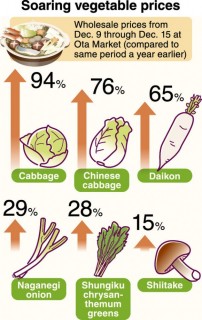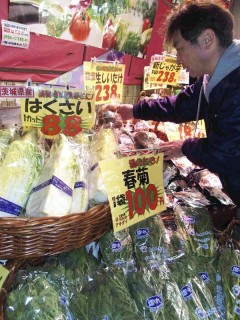Loading
Search
▼ Soaring Vegetable Prices Weighing Heavily on Family Budgets
- Category:Gourmet
Soaring vegetable prices have become a burden on family budgets. Prices of leafy vegetables indispensable for nabe hotpot dishes are hovering at particularly high levels — with Chinese cabbage costing 1.8 times more than a year earlier.
Consumers are refraining from buying vegetables, and this is affecting the whole Japanese economy.
Hiromichi Akiba, president of the Akidai supermarket chain based in Nerima Ward, Tokyo, pointed out that consumers are noticeably avoiding vegetables due to high prices. “We usually sell Chinese cabbages in half portions. This year, however, consumers wouldn’t pick them up unless we cut them into quarters,” said Akiba, 48.
Wholesale prices of vegetables from Dec. 9 through Dec. 15 remained high, according to Ota Market — a metropolitan central wholesale market dealing with farm produce in Ota Ward, Tokyo.
Cabbage prices soared 1.9 times, while daikon cost 1.7 times more than a year earlier. Wholesale prices of naganegi onion and shungiku chrysanthemum greens were 30 percent higher, and shiitake prices rose 15 percent compared to the same period last year.
Unseasonable weather that started in the summer is the main reason for the soaring prices. This delayed the growth of the vegetables, which in turn led to a decrease in shipments.
Prices are expected to remain high for the time being.
According to the Agriculture & Livestock Industries Corp., prices will remain at higher-than-average levels for 13 of 17 vegetables it has been monitoring. Onions are not one those 13 vegetables.
People have become more budget-aware because of the higher prices for vegetables, which are essential for daily meals.
According to an Internal Affairs and Communications Ministry survey on household economies, real consumption expenditure for fresh vegetables in October decreased 8.8 percent compared to a year earlier. That figure suggests consumers bought less vegetables, because the higher prices would have otherwise led to an increase in spending.
Total real consumption expenditure fell 0.4 percent. Half of this decrease is attributable to households spending less on vegetables.
The rate of increase in real wages in October was unchanged from a year earlier. Prior to that, they increased for eight consecutive months through September. The rise in nominal wages was counteracted by price increases, which are themselves attributable to vegetables.
Junko Sakuyama, a senior economist at Dai-ichi Life Research Institute Inc., pointed out that soaring prices of everyday vegetables tends to lead to a deterioration of consumer sentiment. “If they remain high, they could have a lasting negative impact on consumption.”
Prices are expected to remain high for the time being.
According to the Agriculture & Livestock Industries Corp., prices will remain at higher-than-average levels for 13 of 17 vegetables it has been monitoring. Onions are not one those 13 vegetables.
People have become more budget-aware because of the higher prices for vegetables, which are essential for daily meals.
According to an Internal Affairs and Communications Ministry survey on household economies, real consumption expenditure for fresh vegetables in October decreased 8.8 percent compared to a year earlier. That figure suggests consumers bought less vegetables, because the higher prices would have otherwise led to an increase in spending.
Total real consumption expenditure fell 0.4 percent. Half of this decrease is attributable to households spending less on vegetables.
The rate of increase in real wages in October was unchanged from a year earlier. Prior to that, they increased for eight consecutive months through September. The rise in nominal wages was counteracted by price increases, which are themselves attributable to vegetables.
Junko Sakuyama, a senior economist at Dai-ichi Life Research Institute Inc., pointed out that soaring prices of everyday vegetables tends to lead to a deterioration of consumer sentiment. “If they remain high, they could have a lasting negative impact on consumption.”
- December 23, 2016
- Comment (0)
- Trackback(0)



